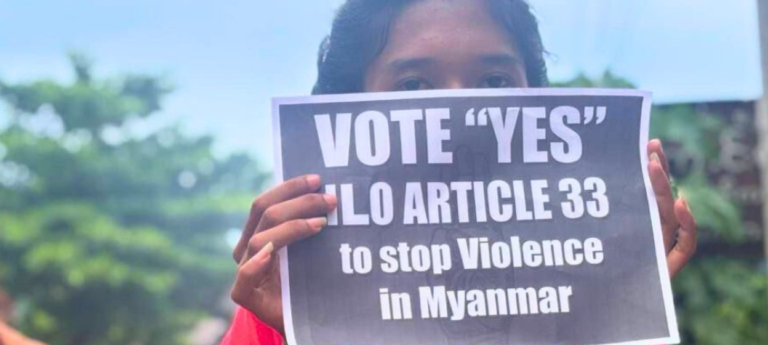
The International Labour Organisation Has New Options to Push Myanmar’s Regime
What might be the right economic tools to wield against Myanmar’s military regime, that minimise harm to the livelihoods of its civilian citizens?
Sometime in the coming fortnight, the International Labour Organisation (ILO) will discuss invoking Article 33 (A.33) of its constitution against Myanmar. The Article requires member states and the ILO to take steps to ensure that Myanmar’s military authority, the State Administration Council (SAC), complies with their labour rights obligations as a signatory.
In practice, however, enforcing compliance is challenging. Numerous measures to do so include some that would apply economic pressure on the SAC. ILO members, the US and Canada, have tried broad economic sanctions on past military regimes in Myanmar. In present-day Myanmar, this approach may unintentionally harm its people’s livelihoods. Other economic tools like supporting livelihoods in areas not under SAC control and expanding the scope of human rights due diligence (HRDD) hold more promise. Combined with political and humanitarian measures that the ILO and key stakeholders propose, such interventions could benefit Myanmar’s people and perhaps apply some pressure on the SAC.
The ILO’s upcoming discussion on A.33 is the latest step responding to the SAC’s post-coup actions. In early 2022, the ILO established a Commission of Inquiry (COI) to investigate the SAC’s non-compliance with conventions on freedom of association and forced labour. The COI found that Myanmar was violating obligations under both conventions: it was persecuting trade union leaders, restricting freedoms of expression and assembly, creating barriers to trade union activity, and systematically using residents to perform forced labour for military purposes. The COI recommended ending all violence against union leaders and members and all forced recruitment, and returning Myanmar to civilian governance with democratic institutions, amongst other actions. The SAC has not complied with these recommendations.
In response, the ILO will now consider invoking A.33 — its most serious option — used only when members fail to carry out COI recommendations or judgments from the International Court of Justice. It has been invoked only twice in history: against Myanmar in 2000 and Belarus in 2023. In early 2025, the ILO released a Draft Resolution on Myanmar, foreshadowing recommendations that could be adopted if A.33 were invoked. These include supporting activities that directly benefit the Myanmar people and ensuring that ILO members’ relations with Myanmar’s military authorities do not enable rights violations.
This dual mandate is sensible but, for some broad economic measures meant to pressure the SAC, it would be difficult to fulfil.
The fundamental challenge to using broad economic levers as “pressure” is that a single economic activity — such as growing rice — can support individual Myanmar farmers but also enable the SAC’s rights violations. This is because the SAC, through its control of the state’s trade and financial systems, extracts a share of the benefits from rice exporting and most other economic activities, by forcing exporters to repatriate their foreign currency earnings and sell them at undervalued rates. This results in losses of around 30 per cent of each shipment’s kyat value, which means less money for all involved, especially farmers. While some of this forex may go to the military, all of it goes through the SAC-controlled financial system. New regulations allow only buyers with SAC permission to buy forex, giving them immense control over forex and deeply limiting the impact of broad economic levers.
This system intertwines the economic fortunes of the SAC with those of Myanmar’s people. It creates risks that broad economic measures like trade embargoes, financial sector sanctions, or divestment campaigns, will cause unintended harm. While A.33 does not mention or require sanctions, they remain an option. The potential harms may explain why calls for broad economic sanctions have been limited; some labour groups question their effectiveness. Other sanctions, like travel bans and asset freezes targeting named individuals and entities, may be more effective and have fewer unintended consequences for Myanmar’s people.
There are alternative, complementary economic levers to pressure the SAC and help Myanmar’s people. First, ILO members can support livelihoods and economic activity in areas not under SAC control, where its trade and financial controls are absent. As many people in such areas are internally displaced persons (IDPs), this approach could be framed in line with the ILO’s Employment and Decent Work for Peace and Resilience Recommendation (R.205), which calls on members to support the livelihoods and socio-economic and labour market integration of IDPs, while supporting host communities. Taking trade-related steps to improve market access and support IDP livelihoods, even if temporarily, could alleviate challenges created by the SAC’s trade blockades in parts of Myanmar and the illegal use of licensing to control trade flows.
In addition, ILO members could require businesses to assess their activities as to whether and how the SAC benefits (through its control of trade and financial systems) and to change the way they operate, to reduce this. This means doing more than HRDD, which seeks to ensure no supply chain connections with the military and military-owned companies). HRDD is necessary but misses the significance of systemic controls. The SAC primarily supports itself not through military-owned companies but by controlling state systems. Thus, businesses and UN agencies should assess how this interacts with their in-country activities, take steps to minimise the effects, and integrate this knowledge into decisions about continuing operations in Myanmar.
Beyond these tools, many measures proposed in the ILO Draft Resolution and by key stakeholders merit support. Calls for further UN system support for displaced trade unionists should receive unequivocal backing, as should calls to ensure the non-refoulement of Myanmar’s trade unionists and human rights defenders. Establishing monitoring mechanisms to protect workers’ rights and deliver redress is also essential. These could include re-establishing an independent forced labour complaints and accountability mechanism and adopting an independent and neutral labour dispute resolution system that applies to enterprises in international supply chains. These steps, when combined with alternative economic levers, may influence the SAC’s behaviour more than broad economic measures.
2025/185
Thank you for reading! Visit us anytime at Myanmar.com for more insights and updates about Myanmar.
Related posts:
 International Call to Free Jailed Journalist in Myanmar
International Call to Free Jailed Journalist in Myanmar
 6-YEAR-OLD GIRL AMONG MYANMAR GROUP ARRESTED IN CONNECTION WITH RETIRED GENERAL’S KILLING
6-YEAR-OLD GIRL AMONG MYANMAR GROUP ARRESTED IN CONNECTION WITH RETIRED GENERAL’S KILLING
 Inle Lake Festival Endures Amid Quakes and Crisis
Inle Lake Festival Endures Amid Quakes and Crisis
 𝗛𝗼𝘄 𝗠𝘆𝗮𝗻𝗺𝗮𝗿’𝘀 𝗖𝘆𝗯𝗲𝗿-𝗦𝗹𝗮𝘃𝗲𝗿𝘆 𝗡𝗲𝘁𝘄𝗼𝗿𝗸𝘀 𝗘𝘅𝗽𝗹𝗼𝗶𝘁 𝗬𝗼𝘂𝗻𝗴 𝗔𝗳𝗿𝗶𝗰𝗮𝗻𝘀 𝗔 𝗡𝗲𝘄 𝗣𝗵𝗮𝘀𝗲 𝗼𝗳 𝗮𝗻 𝗘𝘅𝗽𝗮𝗻𝗱𝗶𝗻𝗴 𝗖𝗿𝗶𝘀𝗶𝘀
𝗛𝗼𝘄 𝗠𝘆𝗮𝗻𝗺𝗮𝗿’𝘀 𝗖𝘆𝗯𝗲𝗿-𝗦𝗹𝗮𝘃𝗲𝗿𝘆 𝗡𝗲𝘁𝘄𝗼𝗿𝗸𝘀 𝗘𝘅𝗽𝗹𝗼𝗶𝘁 𝗬𝗼𝘂𝗻𝗴 𝗔𝗳𝗿𝗶𝗰𝗮𝗻𝘀 𝗔 𝗡𝗲𝘄 𝗣𝗵𝗮𝘀𝗲 𝗼𝗳 𝗮𝗻 𝗘𝘅𝗽𝗮𝗻𝗱𝗶𝗻𝗴 𝗖𝗿𝗶𝘀𝗶𝘀
 CHINA’S BELT AND ROAD IN SOUTHEAST ASIA: A COMPARATIVE LOOK AT MYANMAR, LAOS, AND CAMBODIA
CHINA’S BELT AND ROAD IN SOUTHEAST ASIA: A COMPARATIVE LOOK AT MYANMAR, LAOS, AND CAMBODIA
 Dr. Sasa Resigns from NUG, Restructuring Expected Inside Shadow Government
Dr. Sasa Resigns from NUG, Restructuring Expected Inside Shadow Government
